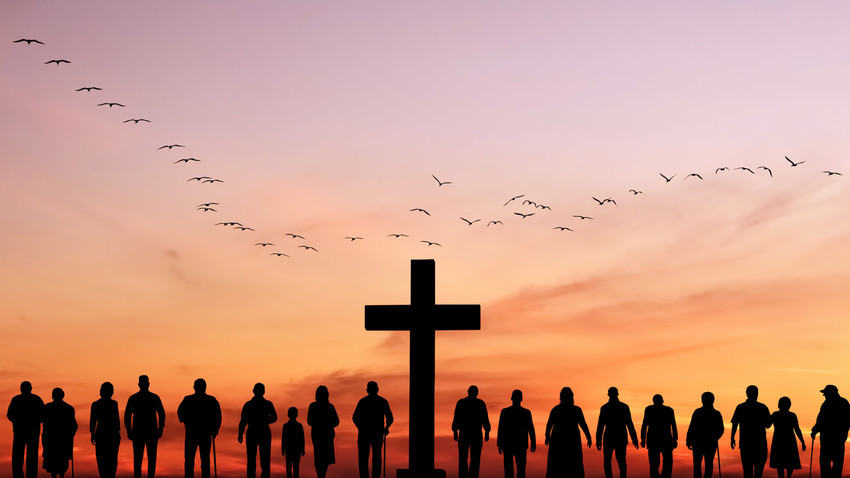When I was little, our family was always in church. Our minister loved preaching about the time of trouble. Know what? In time, his preaching became a time of trouble for me. I was scared witless. I didn’t want Jesus to come again. The thought scared me into the middle of next month.
Well, as a body of believers, we do know (prophetically) quite a bit about the future and what’s coming down the pike. One of the better-known quotations from Ellen White says that usually trouble is worse in expectation than reality—but not this time. The trouble will be far worse than any of us can imagine. So, what do we do now: run for the hills?
First, I want to encourage you to read the tail end of The Great Controversy: chapters 39 and 40. Daniel 12.1 tells us, “Jesus, who stands for God’s people, will stand up, and there will be a time of trouble worse than anything before, but at that time Your people will be delivered.” What a wonderful promise. Jesus will blot out the sins of the saints, so they are prepared. This, of course, is something that heaven would love to do for each one of us.
God will step back and remove His restraints on Satan, who will proceed to bring about a terrible time of trouble. Those of us who persist in honoring all of God’s Law will be considered the cause of all the trouble (by people who hate and will persecute the saints). The term used is that we will be objects of “universal execration.” (Sounds bad, doesn’t it? Look it up.)
Two forces will join to make it look like the saints are all at the point of destruction: Romanism in the old world and Apostate Protestantism in the new. They’ll combine to pass a universal decree that after a certain time, Sabbath keeping saints may all be put to death. The chapter says that for the saints, this is tantamount to the “time of Jacob’s trouble.” Jeremiah 30.7 says we will be saved out of it. (Another one of the “those” promises.) However, between now and then, we need to do everything we can to put ourselves in a proper light to our world to disarm prejudice and avert danger. Question: If trusting God is the only means of deliverance for us, are we working on developing that trust?
Revelation 3.10 says, “I will keep you from the hour of temptation.” Temptation refers to the urge to walk away from God. Will you hang onto Him no matter what? Isaiah 27.5: “Take hold of my strength to make peace with me, and you will make peace with me.”
Question: Why does God permit the saints to go through such a formidable time as awaits us? The final time of trouble consumes all the earthiness of the saints, so Jesus’ likeness is reproduced precisely in each of us. In sinners? Yes, in sinners.
Satan will impersonate the second coming of Jesus, and all the world will claim that the Savior has returned. The saints will recognize the falseness of what the enemy is doing. Rather than bowing the knee to him, we’ll become more than now, diligent students of Scripture and lovers of God’s truth.
Last question: when it looks like God has forgotten us and we’re done for, Psalm 27.5 says the saints will hold their integrity in the face of death. Not only will our characters be transformed, but we will also come out of the time of trouble with a passionate hatred of sin and evil. It’s like when God took Israel out of Egypt; next, he had to take Egypt out of Israel, which was what the spring of Marah did for them. As the time nears, the bitter will do God’s work of grace for each of us, including you. Blessings!
Pastors' Blog
By Pioneer Pastors


Those moments in life always come, particularly when you're doing your best to do good, and that's when you realize you're not making it. What? Give it another chance? You try harder, but that doesn't work any better. Granted, we're all sinners, but is it anywhere in the realm of possibility that a sinner can do better than sin?
Well, as a matter of fact, it is possible, but not for a sinner attempting it on their own. So how can it happen?
Have you been studying the Sabbath School lesson lately? Lesson 10 goes into the subject of the Covenant and the Blueprint. One of the passages studied in that lesson has some things to say about sinners doing good, and I think what it says makes a lot of good sense.
The passage? Ezekiel 36 comes just before Ezekiel's vision of the valley of dry bones in chapter 37, which speaks of the nation of Israel being restored through two things: 1) prophecy (the Word), and 2) the Breath (or Spirit). The last verse in that chapter speaks of the Lord making Israel holy by removing all their spiritual uncleanness. Seems to me that's the only way any one of us will ever become holy—if God makes us holy.
Ezekiel 36 has two basic thoughts: 1) hope for the mountains of Israel, and 2) Israel's restoration is assured. If you've read much about Israel's history, you know that no matter what God did, they always reverted to the ways of the heathen who lived around them. God said (v. 22) that it wasn't for the people's sake he would do some things, but rather for the sake of his great name that they had profaned. When he did what he was planning to do, the nations would know He was the Sovereign Lord and that He was holy.
V. 24-25: "I will gather you from all the countries and bring you back into your own land. I will sprinkle clean water on you, and you will be clean; I will cleanse you from all your impurities and from all your idols."
V. 26: "I will give you a new heart and put a new spirit in you." V. 27: "And I will put my Spirit in you and move you to follow my decrees and be careful to keep my laws." Although He doesn't use the word "holy," it's relatively clear that it will result from all He was about to do. Note: HE was the One doing the doing.
A text in Paul's writings says it very simply: Philippians 2:13, "for it is God who works in you to will and to act in order to fulfill his good purpose." Instead of trying your best to do good and not sin, look to Jesus and put your faith in Him to create a new, clean heart that does good, not wrong. He'll be delighted to use you to bring honor to His name.

Alumni Weekend is coming up soon. For me, it was 1995—and I remember those high school years as some of the happiest times of my life. We didn’t worry about much, except getting to the front of the cafeteria line for lunch and dinner. As a boarding academy, life revolved around living and sharing with friends. Classes and learning were just part of the daily routine—something we had to do, but not what defined us. We didn’t plan much for the future; if it wasn’t happening that day, it felt distant and almost unreal. College seemed like a mystery, and the idea of the year 2000? Unthinkable. Surely Jesus would have come before that big year!
Around this time of year—early September—we were gearing up for our class trip. Earlier that year, we’d made a decision: we wanted the whole class to go, no one left behind. That meant fundraising, and we knew some classmates would struggle to raise the money. So, we chose a different destination than previous years, cooked our own meals on some days, and did everything we could to save money and support each other. In the end, everyone was able to go—and it truly became a trip to remember. The choices we made and the unity we experienced brought us closer together and helped forge lifelong friendships.
Our class verse was a powerful one: “But as for me and my house, we will serve the LORD.” (Joshua 24:15) When Joshua spoke these words to Israel’s leaders, he knew his time was short. He wanted to leave them with a challenge—to choose whom they would serve and be ready to live with the consequences.
In our school in Argentina, that verse became our senior class motto. In Spanish, it read: “Yo y mi 5nto serviremos a Jehová.” At the time, Argentina’s education system included seven years of elementary school and five years of high school—so the fifth year was our equivalent of senior year. Looking back, we were young, bold, and full of conviction. We wanted to declare to the world that we would serve the Lord. It was an honest desire, a noble aspiration. But the question remains: Did we do it?
Now, 30 years later, after forming families and building careers, are all of us still serving the Lord? The answer honestly and sadly is no—not always, and not all. Therefore, the next question is even harder: Are we, each of us who made that declaration, somehow responsible for the spiritual lives of our classmates?
What about you? Maybe your class didn’t have that specific motto. But what about your family? Your circle of friends? Your church? Your community? Your city? After all, we are our brother’s keeper.
Yes, salvation is personal. The desire to serve the Lord must come from the heart of each individual. But it’s also true that the people around us—their influence, their support, their example—can shape our decisions more than we realize.
My prayer is that it could be said of each one of us what was said of Joshua and his generation: “Israel served the LORD all the days of Joshua, and all the days of the elders who outlived Joshua and had known all the work that the LORD did for Israel.” (Joshua 24:31)

Did you know that in the winter, Pioneer Memorial Church is heated by steam from the Andrews University power plant? This steam heats very hot water (around 130°F to 140°F), which circulates throughout the building to warm the air. In the summer, the church is cooled by chilled water from the AU power plant, which cools cold water (about 40°F) that then cools the air to keep us comfortable.
We appreciate your patience and prayers as our church facilities undergo much-needed improvements. We are excited to share that our piping project is progressing well, and we will officially return to the sanctuary this Sabbath, August 30th, with the air conditioning returning by September 6. The repiping will be completed by September 5, ensuring that we have a cool and welcoming worship space once again. While worship returns to the sanctuary, LaPine will continue finalizing project details through the end of September. After their work is complete, we will move on to the next steps of restoration: installing new ceiling grids and tiles, painting, and eventually recarpeting. We thank Plant Services for their flexibility and support throughout this process. The timeline for recarpeting is still being finalized, but we anticipate that the project will be fully completed by mid-to-late October.
In addition to the sanctuary project, we will be repaving the church parking lot next spring. Thank you for your continued support and prayers. These improvements are not only necessary but will also help ensure that our church remains a beautiful and welcoming place of worship for years to come.
In older buildings like Pioneer, the same pipes carry either hot or cold water, which can create stress on the pipes and lead to corrosion. After 60 years of service, some of Pioneer’s pipes are already leaking in certain areas. Thankfully, these leaks have not been catastrophic, but it is certainly time for them to be updated. We invite you to join others in contributing the funds needed for this important but mostly invisible renovation. Look for the “Welcoming All Seasons” banner to track the progress of this campaign.

Several years ago, a Michigander who had just pulled off the interstate (in Michigan) had stopped at the stop sign when suddenly a young fellow, messing with his phone, came barreling into her vehicle from behind. He rammed her and drove her into the path of an oncoming semi. The result was a broken neck and a whole lot of other injuries, which, as I understand, years later, she is still getting treatments for. Just in case you tend to mess with your phone when you’re driving, go online and see what the penalties are.
Three weeks ago, the same woman was involved in something similar—something we wouldn’t have expected. She was driving and reached down and picked up her phone. A nearby police officer spotted what she did and pulled her over. It’s considered a distraction (and it is). She received a citation, which cost her $200, plus additional court costs of $250, and a misdemeanor was recorded on her driving record, along with a point or two, which negatively impacted her insurance costs. In addition to community service hours. The next infraction will be $1,000. The moral? Don’t even THINK about your phone when you’re driving a motor vehicle: it’s cheaper and a lot safer for everyone if you don’t.
On a related note…I live close enough to the University to either walk or ride my bicycle to and from. This provides me with an opportunity to observe the abysmal driving habits of some—like not stopping at a stop sign. I see people running stop signs all over the area. The stop sign located between Pioneer and the Andreasen Center is the one that drivers disobey most often. I pay special attention to this issue because I’m still working on consistently coming to a complete stop myself. When you’re a pedestrian, it’s usually possible to move out of the way if a driver doesn’t stop at the sign. If you’re cycling, it’s tougher to do that. I’m doing a lot better than before: I don’t want to hit a pedestrian or bicyclist or another vehicle—or even worse, a child. Someone has two signs on their front lawn: “Drive like your kids live here.” That makes a lot of sense. It’s a lot safer for all of us if we stop when we should. Do you stop—or do you just go on through? What about from this point forward? What kind of citizen are we?
This is one of those areas of life that may be, for some of us, a real challenge to bring into line. Here is where I think Jesus is ready and able to help us make the changes we absolutely need to. Just ask—and your trust in your ask will bring the transformations you need.
How about joining me in enhancing our safety practices on the road? We could be the means of saving someone’s life.

I love hiking. This week I get to see if I can summit at huge mountain. There’s nothing like starting a mountain climb, full of energy, snacks in your backpack, and the bold confidence. The first mile? Easy. By mile ten, you’re questioning your life choices. By mile fifteen, you’re making deals with God about never skipping leg day again.
But here’s the thing, mountains are Bible famous for a reason. Big things happen on mountains. God gave the Ten Commandments on Mount Sinai (Exodus 19). Jesus preached the Sermon on the Mount (Matthew 5). And let’s not forget, Psalm 121 starts with:
“I lift up my eyes to the mountains—where does my help come from? My help comes from the Lord…”
When you’re huffing and puffing, wondering if the summit is even real, remember: the climb is where God strengthens your spirit. I like hiking mountains because every step reminds me that:
“Those who hope in the Lord will renew their strength. They will soar on wings like eagles…” Isaiah 40:31
And here’s the fun part, reaching the top. You look out, catch your breath, both literally and spiritually, and realize the view is better because of the sweat, the struggle, and the occasional “I’m turning around!” that you didn’t give in to.
So next time you face a mountain, either with boots on or a heavy heart, treat it like an epic God adventure. Pack your faith, pace yourself, and remember: mustard-seed faith can move mountains (Matthew 17:20)…but hiking boots are still highly recommended.

When I think back on my childhood, there are a lot of wonderful memories. Some of the best, however, were from Sabbath afternoons. Sabbaths were filled with family, nature, and friends. I was reminded of this during our summer camping trip to the Upper Peninsula. Sabbaths were the highlight of our trip as we would plan out a special location, meals, and a worship plan. It truly was a delight.
Isaiah 58:13 tells us that when we spend time with God rather than pursuing our own agenda, the Sabbath is a delight. Although this is a verse that is often quoted, sometimes to our kids, the Sabbath does not feel like a delight; often, children are confronted with a list of don’ts rather than opportunities for delight.
For parents, it can also feel difficult to come up with activities week after week when Sabbath is our only break from work. Therefore, here at Pioneer, we are doing two things for this upcoming school year. The first thing we are doing is issuing a challenge: Let us make the Sabbath a delight this year. Let us be intentional and create opportunities to experience the Sabbath in a whole new way. The second thing that Pioneer’s Children and Family Discipleship is doing is that we are committing to creating at least one activity per month for you and your family to be a part of. These will be activities that are not limited to families with kids, but rather, these will be activities that are for the entire church family.
These opportunities for delight do not have to be elaborate; they could be as simple as getting together with friends or family to eat, going on a hike on one of the many trails in this area, or putting together a puzzle on one of our colder Sabbaths.
And perhaps it is not only our kids that need to remember the Sabbath as a delight, but adults also, all too often, lose sight of what God has for us as we keep our eyes on the clock instead of Him. So, I challenge you, let us be intentional, let us make the Sabbath a delight, and let us do it together.

On July 4, 2025, in Seward, Nebraska, something extraordinary happened. The townspeople traveled back in time. How did they do it? They opened the world’s largest time capsule, and for some, their memories were transported back five decades. Some people saw things they had put inside, while others opened packages left by their loved ones who had passed away.
Places can hold a special kind of magic, like a time capsule that brings back childhood memories or first work experiences. They can vividly help the mind to recall moments that seemed to have faded away.
God knows that places can hold deep meaning. In the book of Judges, as the next generation takes center stage, God highlights a place that will remind them of the faithfulness of the past.
Judges 2:1 says, “The angel of the LORD went up from Gilgal to Bochim and said, 'I brought you out of Egypt and led you into the land I had promised to your ancestors. I also said: I will never break my covenant with you.'”
Why did the messenger of the Lord walk from Gilgal to Bochim? Why didn’t God just appear where the leaders were? I believe Gilgal served as a sort of time capsule.
So, what had happened there?
Gilgal was opposite the place where the Israelites had crossed the Jordan River and built a monument of twelve stones as a reminder of God’s amazing deeds, a place where they had reaffirmed their commitment to God in faithfulness.
Joshua 5:9 says, “The LORD then said to Joshua, ‘Today I have rolled away the disgrace of Egypt from you.’Therefore, that place is still called Gilgal today.”
Why did the narrator of the book of Judges mention this? God was reminding the leaders that there were still places that pointed to their faithful obedience to God’s word. God was telling them that there was a faithful generation in the past, and that today, they could choose to remember, they could decide to have a “Gilgal memory,” and receive “Gilgal’s forgiveness.” They could have the future that God wanted for them.
What if we dedicated the places where we live, work, and spend time to be current places of faithfulness? The places and spaces in which we operate can be reminders and motivators of our commitment and recommitment to God’s mission in our lives.

Although it is the 4th of July this week, that is not where my mind has been. This week would have been my brother’s birthday. Richard died a little over 15 years ago, and I think of him on a fairly regular basis. Sometimes I hear a laugh, other times it is the way someone walks. Anytime I need to lift something heavy, I think of Richard. But every year on June 30, I remember him, think about which birthday this would have been for him, and what might have been. All of us have people we have loved and have lost along the journey.
As we look forward to the Second Coming, we hold on to the promise that these goodbyes are temporary. One day, one day soon, Jesus is coming. We are going to look up and see a cloud. I am not sure what it will be about this cloud, but I am sure that when we see it, we will know that it is not like any cloud that has ever been.
And it is amazing to think that in a moment, in the twinkling of an eye, all of the wrongs of the universe will be made right. I am not sure how this can be done, but with each passing day, I cling to that hope more than the day before. I cannot wait to see Jesus. I cannot wait to see Richard.
I cannot wait, but am I ready? Luke 1:17 tells us, "With the spirit and power of Elijah he will go before him, to turn the hearts of parents to their children, and the disobedient to the wisdom of the righteous, to make ready a people prepared for the Lord." We, like Elijah, and like John the Baptist, are tasked with making ready a people prepared for the Lord!
This preparation, according to this verse, is about restoring relationships. We must restore our relationship with God. Sin separated us from Him, but Jesus came to mend that relationship. Like Revelation 3:20 says, we must open that door and let Him in.
It is about restoring relationships with family. How many of us have family members with whom we are not speaking? We need to forgive and ask for forgiveness. Do not let another day pass without doing all that you can to repair what you are able to on your side.
It is also about restoring truth and righteousness. As we celebrate freedom, it is easy to blur the lines between freedom and righteousness. Restoring righteousness is not a mandate to make everyone think and behave like us. Likewise, freedom does not mean that we need to forget what is true --- this is a false dichotomy.
So, as we celebrate the 4th of July and or remember those we have lost along the way, let us look forward to that day when Jesus comes and let us all be ready. It is only after the Second Coming that we will experience true freedom and true righteousness. That will be truly something worth celebrating.

Have you ever run across a comment by Ellen G. White that you’re unsure what to do with? The question in the title of this blog focuses on what we do (or don’t) with some of what she wrote. Do we…or don’t we…believe her?
Back on January 27, 1890, The “Signs of the Times” published an article she authored titled “The Most Effective Agent for God”. It’s kind of a long paragraph, yet it makes a really good point.
The success of a church does not depend on the efforts and labor of the living preacher, but it depends upon the piety of the individual members.” What comes next to my way of thinking is real “food for thought.” “When the members depend upon the minister as their source of power and efficiency, they will be utterly powerless. They will imbibe his impulses, and be stimulated by his ideas, but when he leaves them, they will find themselves in a more hopeless condition than before they had his labors. I hope that none of the churches in our land will depend upon a minister for support in spiritual things, for this is dangerous. When God gives you light, you should praise him for it. If you extol the messenger, you will be left to barrenness of soul.
What Ellen was getting at was you and I as members should never rely on the pastor, but rather look to God and go to work through the abilities God has given us. Continuing:
Just as soon as the members of a church call for the labors of a certain minister, and feel that he must remain with them, it is time that he was removed to another field, that they learn to exercise the ability which God has given them. Let the people go to work. Let them thank God for the encouragement they have received, and then make it manifest that it has wrought in them a good work. Let each member of the church be a living, active agent for God both in the church and out of it. We must all be educated to be independent, not helpless and useless. Let it be seen that Christ, not the minister, is the head of the church. The members of the body of Christ have a part to act, and they will not be accounted faithful unless they do their part. Let a divine work be wrought in every soul, until Christ shall behold his image reflected in his followers.
When we depend on the pastor instead of the Lord it’s time for the Lord to move the pastor. Do we believe what she said?
In a way this is very positive: every member (including you) has been gifted by God with abilities to serve Him and His church. I encourage you and every member of our church family to go to work with our abilities, and in this way, we can reflect the image of Jesus in ourselves. This is a rare privilege.
- ‹ previous
- 2 of 64
- next ›